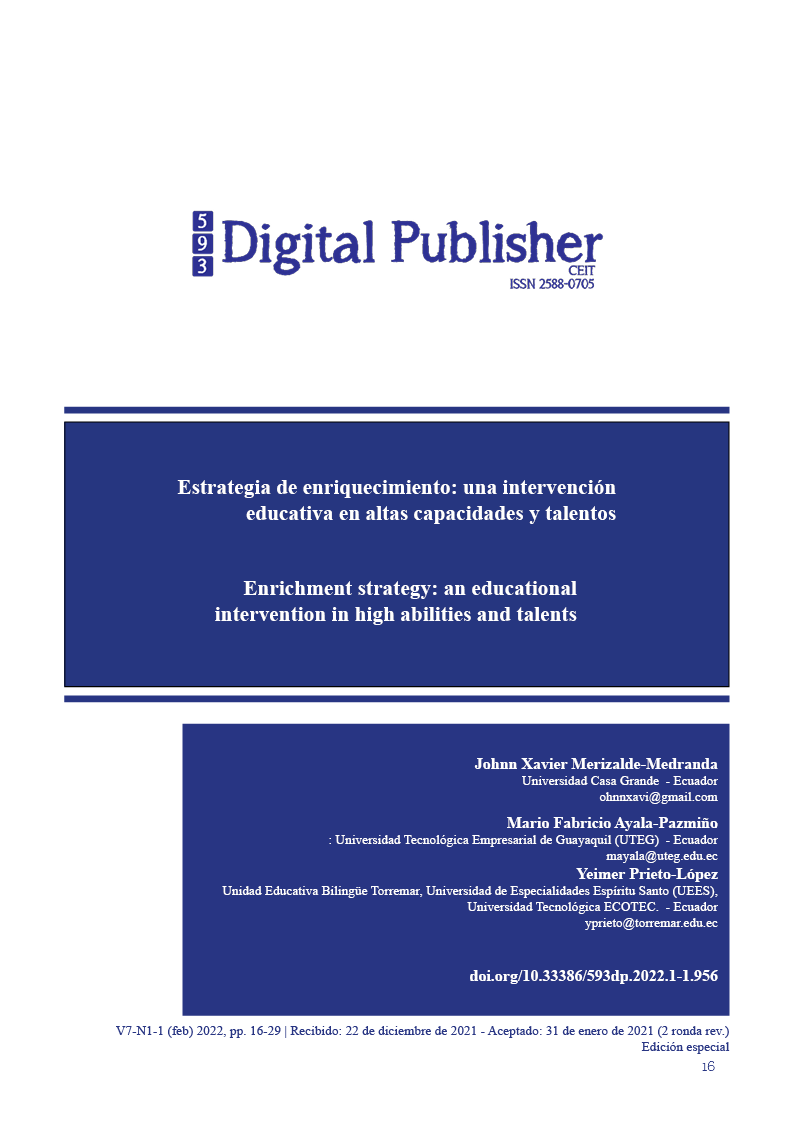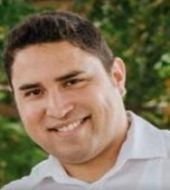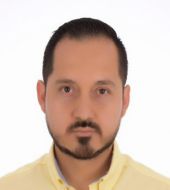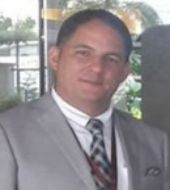Enrichment strategy: an educational intervention in high abilities and talents.
Main Article Content
Abstract
People with high abilities are subjects with a much higher level of ability than their contemporaries in one or more learning categories, obtaining extraordinary and exceptional results (Pfeiffer, 2017). The need for the present work arises due to the high number of students diagnosed with high abilities in an educational center in Guayaquil. It poses a continuous and complex challenge for the teaching staff, which in some cases do not have education-related degrees, or did not receive preparation in their university curricula to respond to the special educational needs of this population. In response to this need, the present work aims to develop an intervention program that favors the development of cognitive skills and social adaptation of a specific group of students with high abilities from second to fourth grade of primary education in an educational center in the city of Guayaquil. As a result, an intervention has been designed that consists of training the teaching team to implement the strategy of curricular enrichment and identify students with high abilities. The intervention proposal has detailed ten sessions, a pretest-posttest questionnaire, and an identification scale for students with high abilities. The methodology is qualitative, action research design. The achievement of the End of Study Work will be evaluated, and it is expected that this type of intervention will improve the performance of students with high abilities in both the academic and socioemotional areas.
Downloads
Article Details

This work is licensed under a Creative Commons Attribution-NonCommercial-ShareAlike 4.0 International License.
1. Derechos de autor
Las obras que se publican en 593 Digital Publisher CEIT están sujetas a los siguientes términos:
1.1. 593 Digital Publisher CEIT, conserva los derechos patrimoniales (copyright) de las obras publicadas, favorece y permite la reutilización de las mismas bajo la licencia Licencia Creative Commons 4.0 de Reconocimiento-NoComercial-CompartirIgual 4.0, por lo cual se pueden copiar, usar, difundir, transmitir y exponer públicamente, siempre que:
1.1.a. Se cite la autoría y fuente original de su publicación (revista, editorial, URL).
1.1.b. No se usen para fines comerciales u onerosos.
1.1.c. Se mencione la existencia y especificaciones de esta licencia de uso.
References
Dabrowsky, K. (2018). Positive disintegration. Boston: Little Brown & Co.
Dimitrov, D. M., & Rumrill Jr, P. D. (2017). Pretest-posttest designs and measurement of change. Work, 20(2), 159-165. Retrieved from: https://content.iospress.com/articles/work/wor00285
Escámez, A. S., & Sánchez, M. J. B. (2017). Identificación del alumno con altas capacidades intelectuales: ¿responsabilidad del maestro o del departamento de orientación educativa y psicopedagógica?. Aula de Encuentro, 19(1). Retrieved from https://revistaselectronicas.ujaen.es/index.php/ADE/article/view/3313
Gagné, F. (2019). Construyendo talentos a partir de la dotación: Breve revisión del MDDT 2.0. MD Valadez y S. Valencia (Comps.), Desarrollo y educación del talento en la adolescencia, 64-78. Retrieved from http://www.eurotalent.org/Gagne_MDDT_Modelo.pdf
Gubbins, E. J. (2020). Three Rings, Three Enrichment Activities, Three Decades Earlier. Gifted Education International, 26(2–3), 157–168. https://doi.org/10.1177/026142941002600304
Hezkuntza, U., & Saila, E. I. (2018). Enriquecimiento curricular. Retrieved from http://www.zuzendari.net/Argitalpenak/docs/100_inclusiva/1002014001c_Pub_EJ_curriculuma_aberastea_c.pdf.
Holland, J. (1978). La elección vocacional. Teoría de las carreras. Editorial Trillas: México.
MINEDUC. (2017). Ley Orgánica de Educación Intercultural. Quito: Ministerio de Educación. Retrieved from: https://educacion.gob.ec/wp-content/uploads/downloads/2017/05/Ley-Organica-Educacion-Intercultural-Codificado.pdf
MINEDUC. (2016). Normativa para regular los procesos de detección, valoración, atención educativa, evaluación de aprendizajes y promoción a estudiantes con dotación superior en el sistema educativo nacional. Quito: Ministerio de Educación. Retrieved from: https://educacion.gob.ec/wp-content/uploads/downloads/2016/09/MINEDUC-ME-2016-00080-A-Normativa-para-Regular-los-Procesos-de-Detecci%C3%B3n-Valoraci%C3%B3n-Atenci%C3%B3n-Educativa-para-estudiantes-con-dotaci%C3%B3n-Superior.pdf
Montero, I. & León, O. (2020). Clasificación y descripción de las metodologías de investigación en Psicología. Revista Internacional de Psicología Clínica y de la Salud, 2(3), 503-508. Retrieved from: https://www.redalyc.org/pdf/337/33720308.pdf
National Association for Gifted Children. (2019). A Definition of Giftedness That Guides Best Practice. Position Statement. Washington. https://files.eric.ed.gov/fulltext/ED600145.pdf
Pfeiffer, S. I. (2017). El Modelo Tripartito sobre la alta capacidad y las mejores prácticas en la evaluación de los más capacitados. Revista de Educación, 368, 66-95. doi:10.4438/1988-592X-RE-2015-368-293
Pfeiffer, S. (2017). Identificación y evaluación del alumnado con altas capacidades. Logroño: UNIR Editorial.
Reis, S. M. & McCoach, D. B. (2019). The underachievement of gifted students: what do we know and where we go? Gifted Child Quarterly, 44(3), 158-170. https://doi.org/10.1177/001698620004400302
Renzulli, J. S. (2018). The Enrichment Trial Model: A guide for developing defensible programs for the gifted and talented. Gifted Child Quarterly, 20, 303-326. https://gifted.uconn.edu/wp-content/uploads/sites/961/2019/11/The_Enrichment_Triad_Model.pdf
Renzulli, J. S. (2018). The three-ring conception of giftedness: A developmental model for promoting creative productivity. In S. M. Reis (Ed.), Reflections on gifted education: Critical works by Joseph S. Renzulli and colleagues (p. 55–90). Prufrock Press. https://pdfs.semanticscholar.org/b0a6/0bdc11e9fefa8c2b1ae71f0fbd324c8fac12.pdf
Renzulli, J. S. & Reis, S. M. (2017). The Schoolwide Enrichment model: A comprehensive plan for educational excellence. Mansfield: Creative Learning Press. https://www.redalyc.org/pdf/3131/313132120002.pdf
Renzulli, J. S. & Reis, S. M. (2017). Enriqueciendo el currículo para todo el alumnado. Madrid: Ápeiron Ediciones.
Sanz, C. (2020). Informe Nacional sobre la educación de los superdotados 2020. Retrieved from: https://www.elmundodelsuperdotado.com/informe-educacion-superdotados/
Sastre, S. (2020). Alta capacidad intelectual: perfeccionismo y regulación metacognitiva. Revista de neurología, 54(1), 21-29. Retrieved from: http://www.webdocente.altascapacidades.es/Modulo-3-Diagnostico/perfeccionismo.pdf
Subotnik, R. F. (2019). A developmental view of giftedness: From being to doing. RoeperReview, 26, 14-15. https://doi.org/10.1080/02783190309554233
Subotnik, R. F., Olszewski-Kubilius, P. & Worrel, F. C. (2020). Rethinking giftedness and gifted education: a proposed direction forward based on psychological science. PsychologicalScience in thePublicInterest, 12, 3-54. doi:10.1177/1529100611418056
Torrano, D. H., & Sánchez, M. G. (2019). El estudio de la alta capacidad intelectual en España: Análisis de la situación actual The study of high intellectual ability in Spain: Analysis of the current situation. Revista de educación, 364, 251-272. Retrieved from: https://sede.educacion.gob.es/publiventa/el-estudio-de-la-alta-capacidad-intelectual-en-espana-analisis-de-la-situacion-actual/investigacion-educativa/16368
Webb, J. T. et al. (2004). Misdiagnosis and dual diagnoses of gifted children and adults. EE.UU.: Great Potential Press. https://doi.org/10.1080/15332276.2006.11673478
Webb, J. T., Gore, J. L., Amend, E. R. & DeVries, A. R. (2017). A parent's guide to gifted children Scottsdale. Arizona: Great Potential Press. https://doi.org/10.1080/02783190903177614




